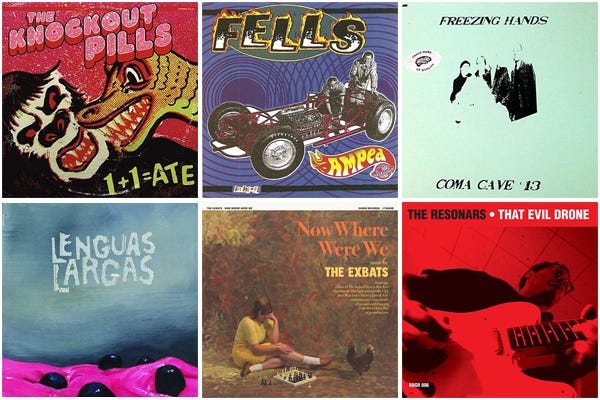May 2024
Detroit House, Township Jazz, Tucson Garage Rock, Solitary Electronics, and a slew of new recommendations
Housekeeping
Now that the redesign is done I’ve been able to focus on updating the database, so the 2024 list is a little more populated :). I’ll be updating more frequently now that I’ve made it a lot easier on myself, and I’ll be adding in more recommendations from newsletters etc., so if you have a favorite music newsletter please let me know. Of course many of the folks who write for Shfl have their own newsletters, all of which are worth subscribing to: Nate Patrin’s brand-new Post-Requisite, Andy Beta’s Beta’s Substack, Joe Muggs’s Bass, Mids, Tops and the Rest, Phil Freeman’s Burning Ambulance, Chris Catchpole’s (and Ted Kessler’s and Niall Doherty’s) The New Cue, and of course Ned Raggett’s Patreon.
I want to sincerely thank everyone who wrote in with feedback, suggestions, and bug reports over the last few weeks :) it’s been immensely helpful, the site’s much better as a result.
Harold Heath on Detroit House
Certainly initially, Detroit house music wore its disco heritage quietly, eschewing its diva vocals and camp energy in favour of outré chord stabs, stately synthetic pads and sci fi synth work. Early/mid-90s Detroit house like the pounding, efficient, shimmering, abstract grooves of K-Hand, the clear, crystalline, functional-funk of Mike Huckaby, or Octave One’s occasional forays into emotive, uplifting deep house were often a little more futuristic and spacey than their euphoric, sweaty Chicago counterparts and often felt a little more measured, restrained and controlled too.
Collections
Megan Iacobini de Fazio on Township Jazz
Apartheid became an official policy in South Africa following the victory of the National Party in the 1948 general elections, and its racist measures were consolidated and enforced over the following decades. The emergence of South African jazz and the pinnacle of its cultural and political significance coincided with this period of increasing violence and racial segregation, as cultural expressions became forms of protest and resistance.
Joshua Levine on Garage and Psychedelic Rock from Tucson, AZ
As the 1990s grew to a close, many second and third-generation local punk bands began looking back to garage and psychedelic rock bands for inspiration. The music mirrored trends in indie rock across the US, but Tucson’s version became and remains mostly insular.
Jon Dale on Solitary Electronics
For some time now, I’ve been fascinated by a particular strain of music – mostly (but not always) purely electronic, not quite ambient, not quite Kosmische, not quite industrial, not quite minimalism – that sits, patiently, on an idea, a sound, a tone, and explores. Often, that exploration can be incremental, and it’s good music for immersion, but not for vagueing out, or drifting away.
Reviews
Phil Freeman
Branford Marsalis - Trio Jeepy
Recorded in January 1988, this long double LP (originally 82 minutes, but a nine-minute version of “Stardust” was cut to get it onto a single CD) features Marsalis and drummer Jeff “Tain” Watts, both 27 at the time, with bassist Milt Hinton, who was 50 years their senior, having been born in 1910.
Branford Marsalis - The Dark Keys
Like Kenny Garrett’s Triology, which preceded it by a year, it’s a solid hour of fierce, challenging music on which everyone is giving it all they’ve got, all the time. The opening title piece borrows John Coltrane’s four-note “A Love Supreme” fanfare, but develops it into something Coltrane might have played in the final year of his life, as Watts hammers the kit behind him; it’s relentless in the best possible way.
Branford Marsalis - Crazy People Music
Crazy People Music was released in the summer of 1990, and marked a creative breakthrough for Branford Marsalis and his quartet. The group, with pianist Kenny Kirkland, bassist Robert Hurst, and drummer Jeff “Tain” Watts, was a hard-gigging road band, having been together since 1986, but this was their first appearance together on record.
Nate Patrin
Azymuth - Light as a Feather
If you know an Azymuth album, it’s probably this one — thanks, in all likelihood, to the modest but memorable cult crossover of “Jazz Carnival,” which hit the UK top 20 singles in 1980. That number isn’t just the biggest hit of this Brazilian fusion outfit’s decades-long career, it’s one of the most joyous disco-jazz cuts ever committed to tape.
Azymuth - Demos (1973-75)
Even in their primordial days, this group of session players-turned-catalysts was aiming towards a clear destination — a hybrid of sounds that took the ‘70s-peaking adventurousness of the moment’s prog/jazz/soul cross-pollination and filtered it through the post-Tropicalia mode of funky MPB.
Rick Anderson
The Kings and Queens of Township Jive: Modern Roots of the Indestructible Beat of Soweto
…it pulls together some fantastic recordings from the 1960s and 1970s by the likes of the Mahotella Queens, the Soul Brothers, and the great saxophonist and bandleader West Nkosi, and presents a nicely varied array of township substyles, from the “groaner” vocals of Mahlathini to Nkosi’s joyful saxophone jive.
The James Moody & Hank Jones Quartet - Our Delight
When this album was recorded, in 2006, pianist Hank Jones was 86 and saxophonist/flutist James Moody was 81. I mention this simply because you’d have no idea, from listening to them play on this magnificent set, that they were both octogenarians.
Ned Raggett
Keeley Forsyth - The Hollow
While it would be stretching a point to say that it’s an album from the immediate post pandemic, there’s a feeling of emerging not from insularity — her work remains compellingly her own — but from a close personal space to a vaster one.
Lightning Bug - No Paradise
On their second album, 2024’s No Paradise, Lightning Bug further demonstrate the American quartet’s involving path around 21st century rock, showcasing both lyrical and musical depth in striking fashion.
Andy Beta
Alice Coltrane - The Carnegie Hall Concert
At first, Alice was asked to just perform one number, the title track to her new album. The slow meditative catharsis of “Journey” (dilated to double its length as both McBee and Garrison widened its space while Sanders and Shepp soared even higher) was so rapturously received that the group played three more numbers.
Triángulos de Luz y Espacios de Sombra
The 17 tracks compiled in this set find its artists in a curious space, not only looking back at the sorts of progressive rock music that emanated from Europe in the 1970s but even further into the past, envisioning what the music of the indigenous Mesoamerican people might have sounded like before the Spaniards and their germs wholly obliterated such cultures.
Jessica Pratt - Here in the Pitch
Pratt might evoke songwriter martyrs like Judee Sill or Margo Guryan or other forgotten folk artists, but her songs make you question time and the past in subtle ways.
Jeff Treppel
Sortilège - Larmes de Héros
It’s a long way to the top if you want to rock n’ roll, especially if you’re a Francophone band playing New Wave of British Heavy Metal-style music in the midst of the thrash and hair metal explosion.
Terminal Nation - Echoes of the Devil's Den
It’s surprising to hear such knuckle-dragging blunt objectors tackling topics like cruelty to the unhoused, police brutality, and environmental devastation. Such repugnant subject matter fits such unpleasant music perfectly.
Harold Heath
Bolis Pupul - Letter to Yu
Producer/singer-songwriter Bolis Pupul’s debut solo album is an inventive, engaging house, electro and synth-pop collection. It’s pleasingly retro in places; when the chorus hook in “Completely Half” hits it feels as though it’s been in your life since it was an early 80s top ten hit, and “Goodnight Mr Yi”’s introductory synth arpeggio has an equally misty-eyed, pre-digital feel, to which Pupul then adds a children’s chorus on a backdrop of rubbery bass, synthetic slivers and robot percussion, creating something that sounds both whimsical and futuristic, which is the mood for much of the album.
Mudd - In the Garden of Mindfulness
A sumptuous entirely instrumental album from label boss, producer and musician Paul Mudd, In The Garden…’s palette is electric pianos, gently pulsing synth pads, wriggling Moog leads, funky clavinets and a languid but superbly tight rhythm section.
Shy Thompson
魔女っ子でポン [Majyokko De Pong]
When Troubadour Record — founded in the early ’90s by a crew of video game composers whose résumés are too expansive to list — got off the ground, they weren’t shy about the influence of anime on their craft. On Majokko de Pon, they pay homage to a particular genre of animation called mahou shoujo (or magical girl), arranging themes from well-known shows like Sailor Moon and cult hits like Akazukin Chacha, synthesizing them with synthpop and blistering breakbeats.
希莉娜依 [Xerinay Malik]
It’s even more common for East Asian television idols to make brief forays into music, resulting in a sea of forgettable one-offs that become footnotes in their careers. One that deserves to be remembered, though, is Chinese TV presenter Xerinay Malik’s sole self-titled album. It was produced and primarily written by Zhang Yadong, who in 1996 was still making a name for himself but would eventually earn the moniker of China’s “golden producer.”













